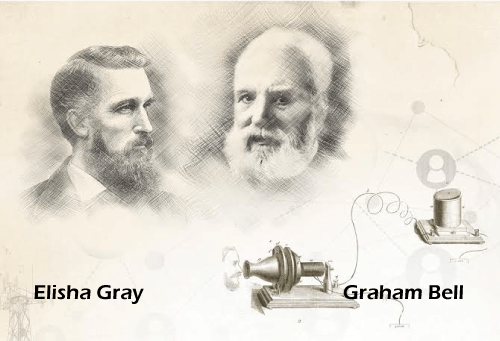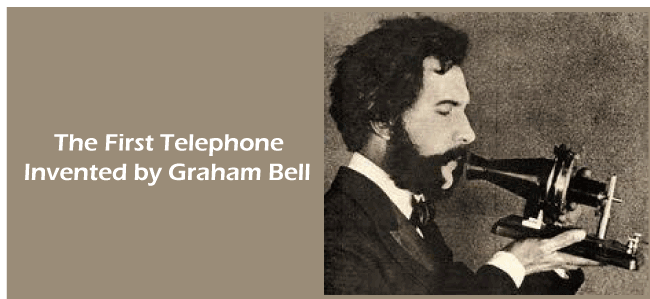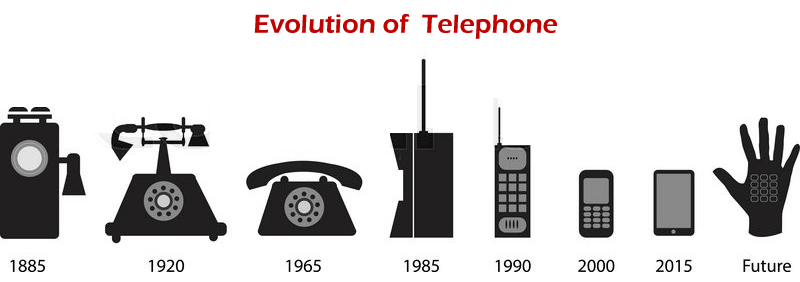Who invented telephone?It was the year 1849 when an Italian immigrant named Antonio Meucci began to create a design for a talking telegraph or telephone. He filed an announcement for the invention of his design of the talking telegraph, but due to some problems, he could not renew his caveat. As a result, his role in the invention of the telephone was overlooked. But on 11th June 2002, the United States House of Representatives passed a resolution for honoring Meucci's contributions and work for the telephone. Who patented the telephone first?In the 1870s, an instrument was developed by two scientists named Elisha Gray and Alexander Graham Bell. Both the scientist developed this device independently. The device that could transmit speech electrically was the telephone. However, both went on the same day on 7th March 1876 to the patent office, but Alexander Graham Bell went one hour before Elisha Gray, and he patented his telephone first. His telephone patent number was 174,456. Afterward, there was a legal battle between them over the invention of the telephone, but Graham Bell won in the end. 
Graham Bell's lifeGraham Bell was born on 3rd March 1847 in Scotland. His grandfather was a teacher of elocution, and his father was also a professor of elocution and speech at Edinburgh University. Even his brother was also associated with elocution and speech. And due to his family, academic background in elocution Graham Bell was also interested in the same as he did his study in the same subject. At the age of 16, he began studying the mechanics of speech. He attended Royal High School and the University of Edinburgh. Later he started a school for the deaf in Boston in 1872. There he taught about the techniques of speech as well as vocal physiology. And very soon, several deaf students have shown their interest and got admission to his school. Later at the age of 26, he got the designation of professor in elocution and speech at the University of Boston without having a university degree. There he met with his wife, Mabel Hubbard, who was also a deaf student, and later they got married in 1877. Graham Bell's mother and wife both were deaf, which influenced his life most, as it was the basic reason that he did research on hearing and speech. He had a wide knowledge of sound and its nature that made him a teacher of deaf as well as also inspired him for making a device like a telephone. Bell's early experiments with sound and speechSince form his childhood, Bell was a very curious as well as a troubleshooter. He was a thinker as he focused on the problem and tried to find out the solution. When he was twelve years old, he saw the problems of the farmers in the field, and then he made an instrument with which the husks of the wheat could remove quickly. This device helps the farmer to a great extent. Further, in 1863, inspired by Sir Charles Whetstone's Automator, Bell with his brother made his own Automator, which was based on Baron Wolfgang Von Kempelen's work. But after sending the report of his work to Alexander Ellis, he came to know through him that the same experiment was already done by a German scientist Hermann Von Helmholtz. Afterward, he continued his experiment with sound and speech. He shifted to Paris, Ontario, in 1870, and there he opened a workshop. He did many tests as well as experiments on electricity and sound that were influenced by the work of Helmholtz. He invented a device that was earlier made by his father for teaching deaf students. The device was known as 'visible speech'. He became trained by his experiments as well as by his teaching to deaf students. On the basis of this expertise, he started the work on harmonic telegraph. Development of telephone by telegraphThe telephone and the telegraph both are wire-based systems. So, that was the basic reason for the success of Graham Bell's invention of the telephone, as it was come by his improvement of the telegraph. When Graham Bell started his work with the electric signal at that time telegraph had already been invented 30 years ago. However, the telegraph was a highly successful system at that time; still, its dot and dash Morse code had limitations for sending and receiving one message at a time. Bell had a wide knowledge about the characteristic of sound as well as the quality of music. And because of these skills, he successfully transmitted more than one message through the same wire at the same time. Since the theory of more than one telegraph had been already given but no one did it practically, and there it was graham Bell, who made it possible as he practically solved this problem as he harmonized the telegraph. The principle behind this harmonized telegraph that numerous messages could be sent at one time over the same wire was the different pitch of messages or signals. Invention of telephoneAfter achieving extensive progress in his research by October 1874, Bell informed Gardiner Greene Hubbard (his father-in-law) about the possibility of multiple telegraphs. Hubbard saw his potential and gave him financial backing as he needed it. For developing the device on which communication could be established through the electric wire, Bell was assisted by an electrician named Thomas Watson, and actually, it was the plane of both to do an experiment on such a device. In the year 1875, during his experiment with his device, he revealed that he could hear a sound over a wire. The sound was just like a twing twang of clock spring. And finally, on 10th March 1876, Graham Bell achieved his greatest success with the birth of the telephone as well as the death of the multiple telegraphs. With this device, he first called Watson, who was in another room at that time. He speaks, "Mr. Watson come here, I want to see you." And these words were the first-ever words transmitted over a wire. The information about his successful experiment with the telephone on 10th March 1876 was described in Bell's notebook entry. 
The first three great test calls by telephoneAfter this, the three great tests of the telephone were made; on 3rd August 1876, the first call was placed between Bell and his uncle professor David Charles at a longer distance in Ontario. The second call was placed the very next day on 4th August. This call was placed from the Telegraph Office of Brantford to Melville House. After that, on 10th August, the third call was placed from Brantford to Paris, Ontario. It was the first longest call ever before. Later these three great and important calls were appreciated by different people. Scientific American explained these calls as "The Human Voice transmitted by Telegraph." Thomas Costain called these tests "The Three great tests of the Telephone." One of the reviewers had written about the utility of this invention in the future. She said that all the people who were related to these important test calls could not think at that time about its impact on future communications. New improvements on telephoneThe Bell's telephone company, which today is known as AT&T, was created in 1877. The engineers of Bell's company made numerous improvements to the telephone. After these improvements, very soon, this communication device became very popular as it is used by more than 150,000 people in the United States by 1886. However, before this successful use of the telephone, in 1879, the company of Graham Bell adopted the patent of Edison of the carbon microphone. And on the basis of this, they made improvements that shorted out some problems like shouting during the call; earlier, the caller had to speak loudly so that the receiver could hear him clearly. The use of a carbon microphone also made the device more capable and practical for talking to long-distance places than earlier. Graham Bell made the first transcontinental phone call from AT&T Head Office New York to San Francisco talked with Thomas Watson in January 1915. The New York Times reported: "In 1876, Graham Bell talked to Thomas Watson over the telephone. Their distance was 2 miles away from each other at that time. And this telephonic communication was the first proper communication on this device. And now in 1915, again the same people bell and Watson talked on telephone at a longer distance than that time as of 3,400 miles away from each other. In this call bell was in New York and Watson was in San Francisco." Bell's wide knowledge and his achievementsHowever, since Bell is known for his development of the communication device telephone but his interest in areas was very wide. One of the Bell's biographers named Charlotte Gray said about him that for increasing his knowledge and widening his areas of interest, he often used to read the Encyclopedia Britannica voraciously. His genius is represented by his number of patents. He had been granted 18 patents only in his name alone, 12 he shares with his collaborators. These included 14 for the telegraph and telephone, 4 for the Photophone, 1 for the Phonograph, 5 for the Aerial Vehicles, 4 for the Hydroairplanes, and 2 for the Selenium cells. Bell's other inventionsGraham Bell, due to his unceasing scientific curiosity, did not stop and continued his new inventions. His accomplishments are:-
Later Graham Bell also made Metal Jacket for helping in breathing and an instrument that could locate the iceberg. He also did the research for separating the salt from the seawater as well as found out the different sources for fuel. Bell's accomplishmentsHe got the French Volta prize in 1880. The money that he got from the prize was used that for the establishment of Volta Laboratory in Washington D.C. The Laboratory was devoted to scientific discovery. He developed various methods for teaching the deaf. In this respect, he met Helen Keller, who was the author as well as the inspiration for the deaf and blind people. Bell also worked with her. He helped to launch the science magazine as well as worked as president for the National Geographic Society. While working in Volta Laboratory, he did experiment on a magnetic field to reproduced sound, but he remained unsuccessful in this trial. However, afterward on the basis of this basic principle the devices like; Tape Recorders, Hard Disc and Floppy Disc, and other Magnetic Media were invented. Evolution in telephoneLater many more improvements were made on the telephone that brings an evolution in the communication sector. Some of them are; trunk lines, cordless phones, cellular phones, etc. Because of the evolution in the telephone, it became one of the most important and widely used devices for communications. Still, with new improvements, this electronic gadget remaining the center of attraction, especially for the younger generation. 
Important quotations by Graham BellMoreover, Graham Bell not only invented so many devices, but he has also given several inspirational and motivational quotations. Some of them are: "Before anything else, preparation is the key to success". "The only difference between success and failure is the ability to take action". Tribute to the great inventorGraham Bell died due to his diabetes complications at the age of 75 on 2nd August 1992. For paying tribute to this great inventor in North America, all the telephones were muted at the time of his funeral. He is always remembered for his work in sound technology as well as for improving education for the deaf. His invention of the telephone was a revolution in the field of communication.
Next TopicWho Invented Calculator
|
 For Videos Join Our Youtube Channel: Join Now
For Videos Join Our Youtube Channel: Join Now
Feedback
- Send your Feedback to [email protected]
Help Others, Please Share










